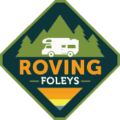Share via:
RVing is popular like never before. Even with the recent slowing of new unit sales, the RVIA states that nearly 280,000 new RVs have been purchased through August of this year.(1) Many of these new RV owners are new to RV Living altogether. We get questions all the time from new owners looking for rv tips on all kinds of subjects.
We remember having some of the same questions when we got started. It all felt so overwhelming at times. So we have compiled some of our best RV tips right here to answer many of your questions.
Table of Contents
5 Things I Should Know As a Potential RV Owner
1) Take It For A Test Drive
NO, I am not telling you to take an actual test drive. What I am telling you is spend the time to get comfortable in the RV you want to purchase. There is nothing worse than realizing that you bought the wrong rig (yes this happened to us.) You may feel a little uncomfortable doing this and the salesman may give you a funny look, but he’s not the one buying – YOU ARE!.
Practice “living” in the rig, trying to consider and discuss how life will be when you are spending significant time in a small space.
Lie on the beds and look around. Are the walls closing in? Do you have a comfortable spot to watch TV? Do you hit your knees getting in and out of bed? Is there enough space for you to move around the room? These are things that will drive you NUTS down the road.
In our first travel trailer, we had barely enough room to climb into bed, nor did the dog…..this did not work for us as you can imagine!
Sit on the toilet (not for REAL c’mon people), get in and out of the shower, lean over the sink. Will there be enough storage in the bathroom for everything? Towels? Toiletries?
"Buying an RV isn’t an easy decision to make. It’s more than just buying an RV. It’s learning how to drive or tow it. It’s learning how to do your maintenance and when to take it to the shop. It’s learning how to overcome the sticker shock of gas prices versus mileage."
Melissa Popp, TripSavvy Tweet
Pretend you are going through your bedtime ritual. Go into the living area and turn on the tv and stretch out. If your butt doesn’t like the seat, consider that carefully. Does this setup suit you, or should you look at another floor plan?
As you are working your way around, consider the storage areas that are available, and the things that you want to bring. Do you have loads of DVD’s, games, homeschool supplies? Is there enough closet space for clothes, linens and towels? Where is your laundry going to go?
Consider where all of your belongings will go, especially in the kitchen. Make sure that the space is comfortable for you to live in. Make several trips in and out if necessary.
When we chose our RV, we spent dozens of hours inside dozens of models. We brought the kids along as well so that they could try out their potential new digs. It really made for some fun adventures. Then, once we had chosen a model we liked, we spent several hours on several trips to go through every nook and cranny. We discussed everything that mattered to us – clothing, bedding, food, storage space, kids toy space, the dog etc. Try to think of all the little things that will annoy you once you are on the road.
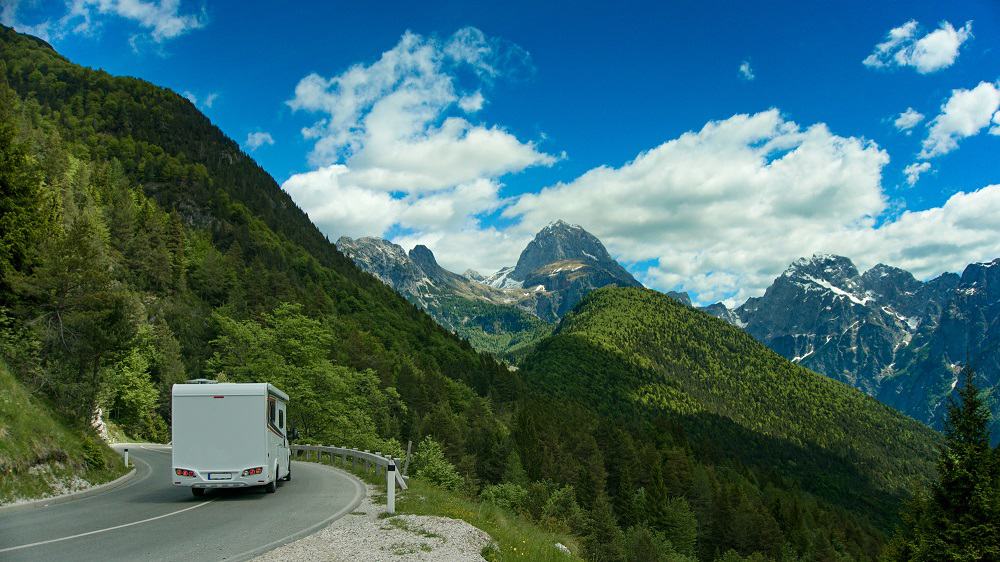
-
Save
2) Bigger Engines Are Better
If you are shopping for a tow vehicle, a few extra horses under the hood is never a problem. Go on…..you know you want to. Believe me, you will thank me in the mountains!
3) Buy the RV you Need
A lot of people will tell you to buy the RV you need the first time. It is very good advice. We did NOT do this. We did all of the right research, saw dozens of RV’s, and settled on the one we thought was right for us- a fifth wheel with a bunkhouse for the kids. Do you plan to stay in parks, or will you be boondocking?
Then we went to an RV show and saw a really good deal on an almost new travel trailer, but it was much smaller. We talked ourselves into the deal. Then after 2 weeks on the road, we went back and traded it in on the fifth wheel- at great expense. Don’t make our mistake. Do the research, ask yourselves all the questions, and stick to your gut.
4) Know Your Weights and Measurements
When deciding on an RV or matching a tow vehicle to an RV, it is very important to know your weight capacities. This subject is very difficult for many people to understand, and as a result Good Sams estimates that over 50% of RV’s exceed at least one weight rating.(3) That is a very ominous statistic. Luckily there are fantastic resources to help you match your RV and tow vehicle. Read this article and others you will find online to get a good understanding of these capacities before you buy.
5) Take Advantage of Online Resources
The internet is your best friend as an RVer. There are some awesome Facebook groups online where fellow RVers are happy to answer your questions and help you through the RV buying process. Take the time to go into these groups, you will surprised as to how friendly the RV community is. Anything you need, from finding friends in the RV community, to You Tube videos to help you fix just about everything, can be found on the web. Remember that you are not alone, we’re all in this crazy journey together.
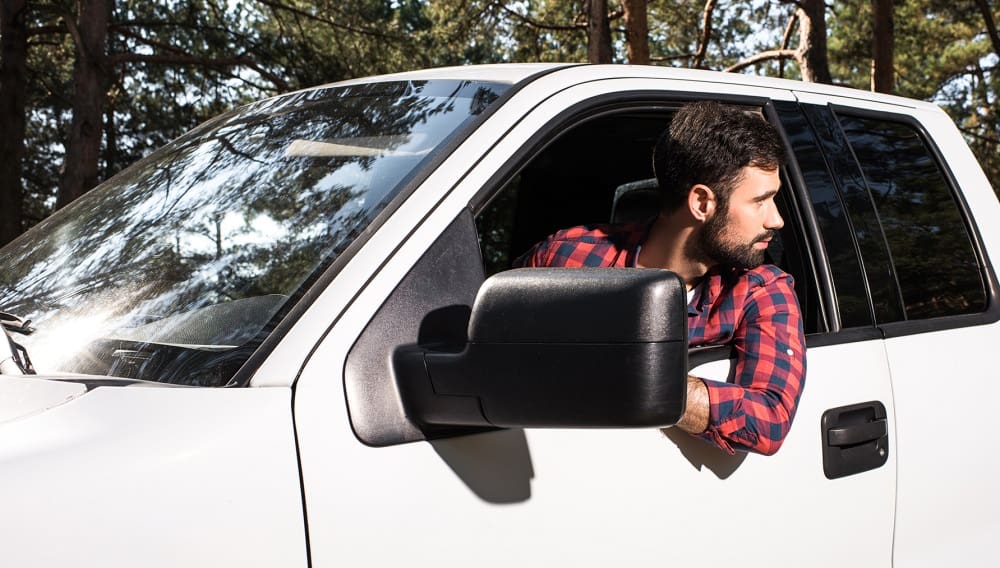
-
Save
RV Travel Day: 20 Quick Tips for RV Beginners
1) Get Some Practice Driving Your Rig
Backing into RV sites is hard and requires practice. Not having enough skills here can lead quickly to divorce. Take your rig to a very large parking area where you can get used to the “handling.” If you should get into a tough spot at the campground, just ask the neighbors. Trust me, they are watching you……. and one of them used to drive trucks!
2) When Backing In, Stay in the Mirror
If you are the one helping to back your rig into a spot- remember that the driver cannot see you if you cannot see the driver. Make sure you can see him/her in the side mirror at all times. Walkie Talkies are great for this purpose as well. Getting run over by a 10,000-pound RV sucks for both you AND the driver.
3) Leave Ample Room To Stop
RV’s are big and heavy. When they are moving at 40 or 50 miles per hour, they take some time to stop. Always keep this in mind when on the road. Leave extra room between you and the car in front of you. Axel Addict recommends a 4-6 second gap between you and traffic in front of you.(2) You will understand this better after your first panicked stop on the freeway.
4) Add A Fish Eye Mirror
Driving a large vehicle down the freeway is not at all like driving a car. Make sure you have your blind spots covered with convex mirrors that allow you to see what is right beside you.
"RVing can often be a game of weights, measurements, and balances. Rookie and seasoned RVers alike need to know the importance of their rig’s different size and weight dimensions to have a safe RVing experience."
TripSavvy Tweet
5) Use Only Septic Safe Toilet Paper
Yeah yeah yeah, we know- someone out there says that they use Uber-Fluffy Charmin and never had a problem. There’s one in every crowd. If you are going with that, please also pay attention to the hundreds of people who have clogged their black tanks and had Uber-Poopy problems. No thanks, I’ll just go ahead and play it safe. Scotts 1000 can be found almost anywhere, including several dollar store chains. It’s cheap- cleans up nice, and dissolves almost instantly.
QUICK PRO TIP: Do NOT buy the generic brand, it’s lets say not very comfortable on the tushee.
6) Know How To Read a Map
GPS is not perfect. We have been led down dead ends, dirt roads etc. Always keep an atlas in your driver just in case. Each traveler should know the ins and outs of map reading so that they can act as the “navigator” if necessary.
7) Travel With Empty Water Tanks
If there is water at or near your destination- don’t fill your fresh tank until you land. Water is very heavy so if you do not need to haul it, you should not.
8) Ice Cleans the Black Tank
Drop a bag or 2 of ice down the toilet before you leave. The sloshing ice will scrape and clean the black tank while you travel.
If you let your dog sleep in bed with you once, he’s going to expect to sleep there every night. Be cautious. Cuddly Fido is a pain when he's T-boning you and your spouse and chasing rabbits in his dreams.
9) Keep an Eye on Your Tires
Tire pressure is super-important in RV’ing. Blowouts on your rig are a major pain (blowouts can and will do MAJOR damage to the rig) so it is wise to do everything possible to avoid them. Always check your pressure and inspect your tires before hitting the road. If you are on a long haul, check pressure and inspect during the day. Cold tires should be AT recommended max pressure.
When you drive, the heat will raise the pressure around 5-10 lbs. That is fine and expected. Do not let air out of hot tires to get back to the recommended pressure. TPMS (Tire Pressure Monitoring Systems) are awesome and highly recommended. They may well save you a costly repair.
10) Start Looking For Fuel at 1/2 Tank
Law One Of RVing: Fuel gauges tend to be a bit slower on the first half tank, then drop like a rock for the second half.
Law 2 Of RVing: Fuel station locations drop dramatically in frequency once you dip below 1/4 of a tank.
Don’t be like me – letting my fuel drop to less than a quarter of a tank whilst driving across the middle of Utah. Yup right into Spotted Wolf Canyon, the longest stretch of highway in the US with NO services. Luckily, I decided to pull off at a scenic view shortly into the stretch and ask someone where the next gas was. I found out that it was about 80 miles ahead. WOOF. I then had to backtrack about 20 miles to the last gas I had passed and fill up. Never again.
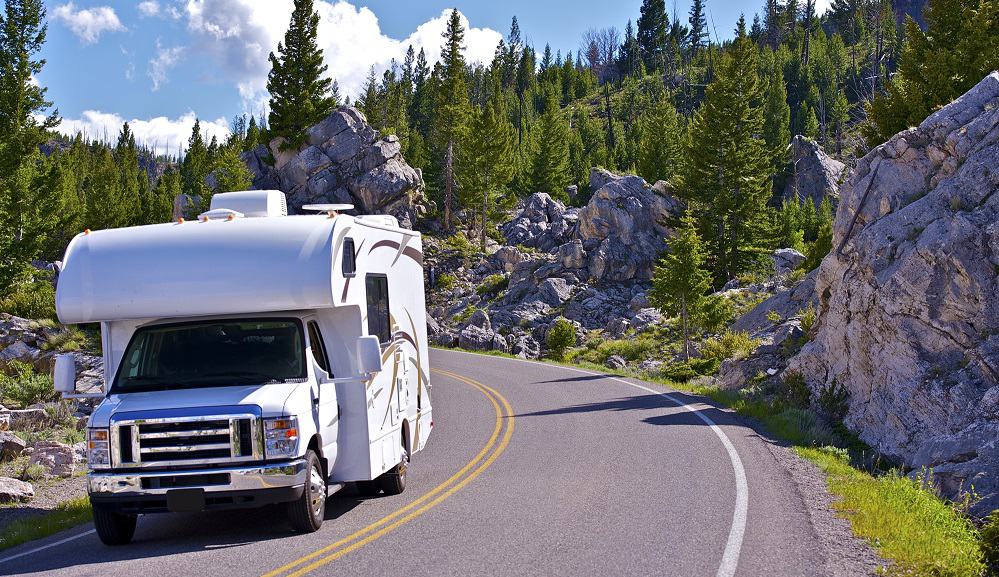
-
Save
11) There Is Never Enough RV Storage
RV storage space is finite. Each rig only has so much and it never seems to be enough. But you can learn how to maximize your space so that you have everything you need on board. Remember that you are downsizing for a reason, and try to really think through what you will need, leaving some room for the things you will inevitably pick up along the way.
12) Keep A Stocked First Aid Kit
Great RVing locations do not tend to be near major facilities- they tend to be further out in nature. Having a well supplied first aid kit is important so that if anything happens, you are prepared to take action while help comes to you.
13) Slow Down
RVing is about relaxing and enjoying the little things in life. So don’t let yourself get rushed by tight timetables or traffic. There are a LOT of little things to remember and consider when on the road, so allow yourself plenty of time and take things slow.
“Slow down and enjoy life. It’s not only the scenery you miss by going to fast – you also miss the sense of where you are going and why.”
-Eddie Cantor Tweet
14) Enjoy The Ride
It’s it often the journey, as much as the RV destination that gets remembered, so stop at roadside diners, greasy spoons, and any place with the word “EATS” spelled out in neon. Thrillist kindly provides a list of the weirdest places in each and every state. Stop and see a few. Check out awesome parks and National Monuments. You won’t be sorry.
15) Use a Pre-Departure Checklist
Don’t underestimate the importance of a pre-departure walk-around. A last minute inspection of your road-ready rig will not only catch any minor (or major) items that you may have missed, it will give you piece of mind as you travel down the road. Nothing worse than getting up to speed only to realize that the outdoor kitchen has come open (yes, we did that.)
Your best bet is to use our Travel Day Checklist included in our FREE Ultimate RV Bundle. You don’t want to get to an RV park and realize you have forgotten your clothes.
The key to successful baking in your RV oven is to make a few adjustments, learn how your specific RV oven works, and don’t be afraid to give it a try. Before you know it you’ll be cooking like a pro in your home on wheels!
Amanda Watson, DoItYourselfRV Tweet
"In recent years solar panels have grown in popularity and dropped in cost. These panels convert energy from the sun into low voltage direct current that is stored within a battery system. The batteries store the power until you need it. When the sun goes down you can draw power from the batteries to run electrical items within your RV. From microwaves and TVs, to laptops and phones, nearly all your electrical needs can be met by using your stored solar energy."
Dee Montana, RVSHare Tweet
16) Use a Water Filter
When you travel, you will hook up to all kinds of different water supplies. Not all of these will be top notch water, so make sure you have a good filter system for drinking water.
17) Keep Shoes Outside
To avoid tracking in a mess, we keep our shoes outside. We have a bin right outside the door to put our shoes in. We also have a large walk-off mat right inside the door to catch any dirt sand sand that makes it through the door. This save a LOT of vacuum time. If there is a lot of rain coming, we just put the shoe bin inside on the walk-off mat.
18) Mind Your Awning and the Weather
Wind gusts are the number one enemy of your awning. In the last 4 months, we have seen 3 of our neighbors lose their awnings due to bad weather. Keep an eye on the weather and take a few minutes to roll up your awning when things look bad. This hassle is NOTHING compared with having your awning ripped off the rig. Insurance (if they pay for it-many do not) takes weeks or months to come through.
19) Get A Vista Shad19
The Vista Shade is probably the best thing we ever bought. It is a large screen that hangs down from the awning, and is tied to the ground. It provides great shade all day and ties down the awning. When we need to roll up the awning, it easily unzips. When storms come in we just drop it to the ground and roll up the awning.
20) Outdoor Rugs Are Totally Worth It
Outdoor RV rugs are worth the cost to create extended living space. They define your space, and keep dirt and dust to a minimum. A good rug should last you years, ours has lasted over 4 years now. We have 2 rugs to span the length of our rig. Combined with the awning screen, they create the look and feel of a nice living space.
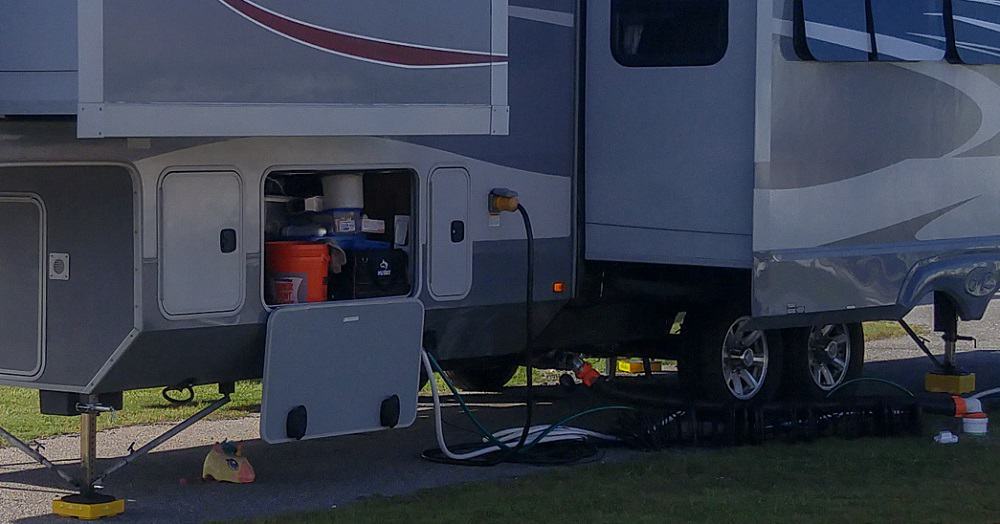
-
Save
5 Tips For Under the RV
1) Bring A Tarp
An 8’x10’ tarp should be a staple in your “basement.” A good tarp has a million uses and takes up very little space. You can use it as a beach cover under your blanket, to cover things up during an unexpected rain storm, or for emergencies like a roof leak.
2) Don't Forget Gorilla Tape
Gorilla tape has surpassed duct tape as the number one item to have. It is stronger and thicker than duct tape, and seems to last longer. The uses are absolutely endless.
3) Add PVC Storage
Hanging PVC pipe from the ceiling of your basement storage is a great way to hold fishing poles, a rake, or pressure wand.
Backing into RV sites is hard and requires practice. Not having enough skills here can lead quickly to divorce. Take your rig to a very large parking area where you can get used to the "handling." If you should get into a tough spot at the campground- just ask the neighbors. Trust me- they are watching you- and one of them used to drive trucks!
4) Upgrade Your Jack
PLEASE get a better jack than the one that came with your RV. A hydraulic floor jack and 4-Way lug wrench are invaluable for blowout days. An battery operated impact driver is also a wonderful thing to have on hand for changing tires. We learned this the hard way!
5) You Need To Have Basic Tools
RV’s, just like houses, are in constant need of repair and fix-it work. Have a good set of tools so that you can do the smaller jobs and save a ton of money. Most mobile technicians will charge you a chunk of change just to come out to you. Many RV repair jobs are pretty easy to handle, and there are always You Tube videos to help you out.
5 Tips For Keeping The RV Clean and Maintained
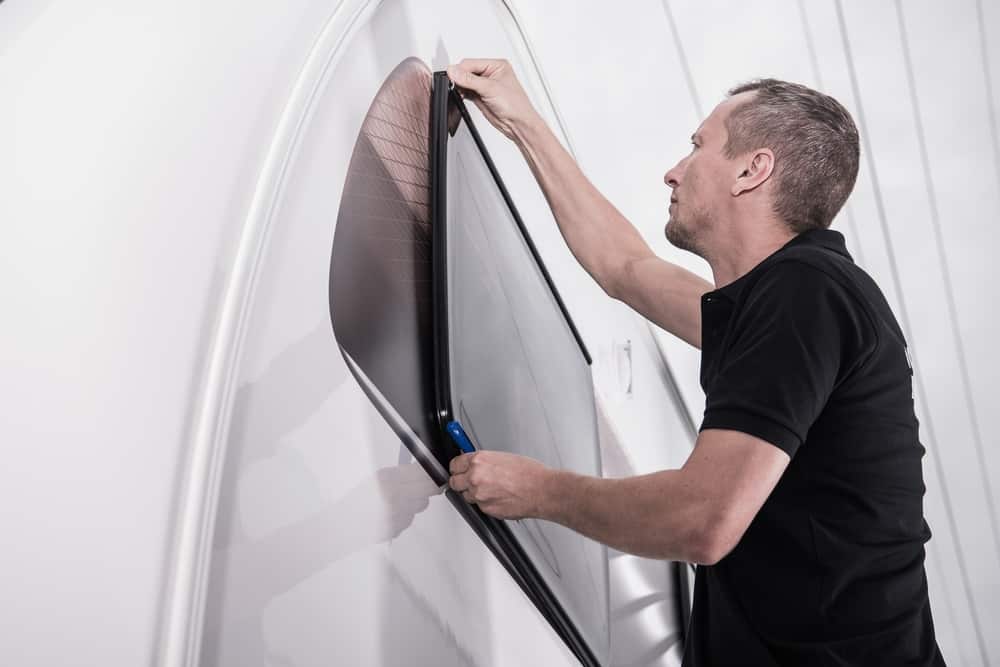
-
Save
1) Water Is The Enemy!
Water leaks are the insidious villains of RV ownership. KOA says that every seam on your RV and anywhere the manufacturer cut a hole in your RV has the potential to allow water in. To protect your investment and your wallet take the time to REALLY inspect all of these seams and sealants.(4) Make a schedule to check over all of the seals and seams of your rig every couple of months.
Check that windows close completely, and put RV Seal Conditioner on all window and slide gaskets to keep them pliable. If they get worn, replace them with new ones. Also check all of the caulking joints for cracks and replace caulking as needed. This is especially important for the roof. Use approved RV Lap Sealant to replace bad caulking.
2) Clean Your Roof
The EPDM roof on your RV is made to live a long life. Help it along by cleaning and conditioning the roof 2-3 times a year. Keeping the roof clean will also help reflect away more sunlight, lowering your need for AC in hotter weather. Inspect the roof at this time for any seam cracks and replace old lap sealant with new.
3) Clean The Inside
Clean up your living space before putting your RV into storage. Give the carpets a steam, and wash everything down, You’ll be happy you did come spring.
4) Don't Let Bugs Live
Winterizing time, or opening time is also a good time to inspect for any bugs. We drop a couple of bug bombs about 2 times a year just to be sure. We also spread insect granules over our campsites at arrival.
5) Cleaning The Outside
Use a soft telescoping brush for scrubbing the RV down. I like to give my rig a wash/ wax about 3 times a year. I use Wash Wax All which I get on Amazon. It is super easy to use and makes the job much faster.
3 Tips For RVing With Pets
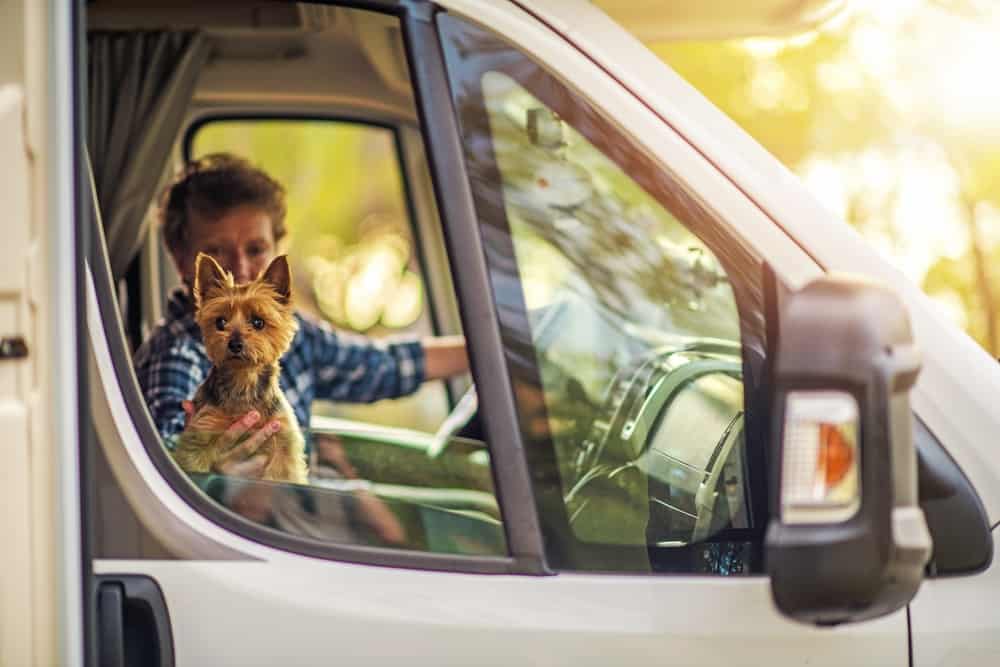
-
Save
1) RV 101 for Pets
Pick up after pets, keep them on leashes at all times, and take them for a good walk every day. Try to find places that they can go with you- like for a stroll in the local town, or to a pet friendly beach. Life for a dog in an RV can get pretty boring if their owner doesn’t make a little effort. Check out our full Guide To Traveling With Dogs.
2) Dogs In The Bed
If you let your dog sleep in bed with you once, he’s going to expect to sleep there every night. Be cautious. Cuddly Fido is a pain when he’s T-boning you and your spouse and chasing rabbits in his dreams.
3) Bring A Lead So They Can Be Outside
A nice, reasonably long lead with a stake in the ground can give your pet some roaming room outside, without having to be attached to you. Just mind the barking. If it gets too much, take them in. We have seen too many barking dogs left outside, this is unfair to the rest of us.
"Clever and safety-conscious RVers use remote temperature sensors to ensure that pets stay cool. The devices monitor the temperature inside the RV and can send an alert to your cell phone if it gets too hot or too cold — although they cannot be relied on in areas with spotty cell phone reception. Other devices can be set to turn the generator on or off when the RV reaches preset temperatures. Choose a temperature monitor with battery backup in case the power fails."
vetStreet,com Tweet
5 Tips For Winterizing Your RV
There are a few simple steps to preparing your RV for winter. Consult your own owners manual to check for instructions specific to your rig.
- Drain Water From All Tanks- empty and flush all of your waste tanks. Also drain the fresh water tank. Drain the water heater.
- Drain Water From The Pipes- Use the low point drains to drain water out of the pipes (with all faucets open.) Remove and bypass any in-line water filters.
- Fill The Pipes With Antifreeze- BYPASS THE WATER HEATER FIRST! Check your particular rig for the proper method of adding antifreeze.
- Seal Any Openings- check all around your rig for any openings that may be used by mice to enter the rig. Seal these openings with expanding foam.
- Charge And Store Your Batteries- best to put them inside, but a fully charged battery will not freeze, so if you need to leave them in the rig- just make sure to fully charge.
(1) RVIA August 2019 Report, https://www.rvia.org/news-insights/rv-shipments-august-2019
(2) Don Bobbitt, RV Driving Tips: Critical Differences About Driving a Motorhome, https://axleaddict.com/rvs/RV-on-the-Road-RV-Driving-Tips
(3)Gary Bunzer, Matching the Perfect RV to the Perfect Tow Vehicle, https://blog.goodsam.com/tow-vehicle/
(4)Scott Roepel, Best Holding Tank Treatments, https://www.thedrive.com/reviews/29907/best-rv-holding-tank-treatments
(4) Mark J Polk, Are You Really Inspecting Your RV For Water Damage? ,http://rvservices.koa.com/rvinformation/rvmaintenance/are-you-really-inspecting-your-rv-for-water-damage.asp
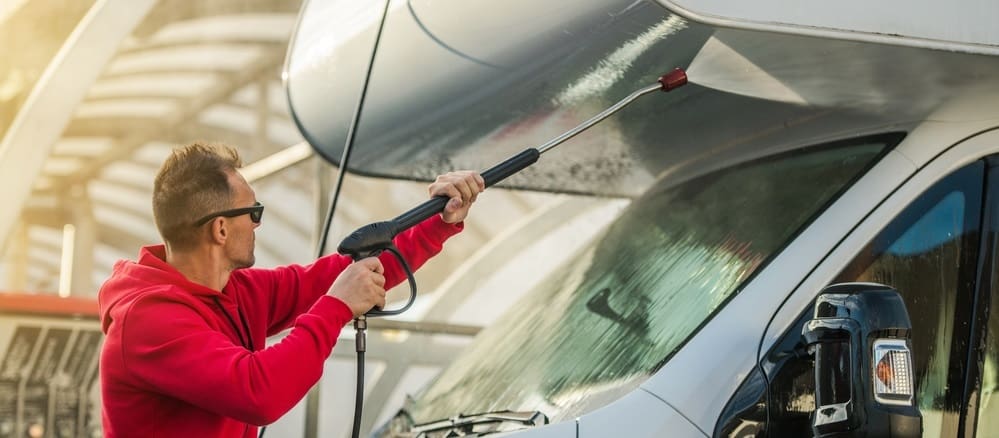
-
Save
Share via:
